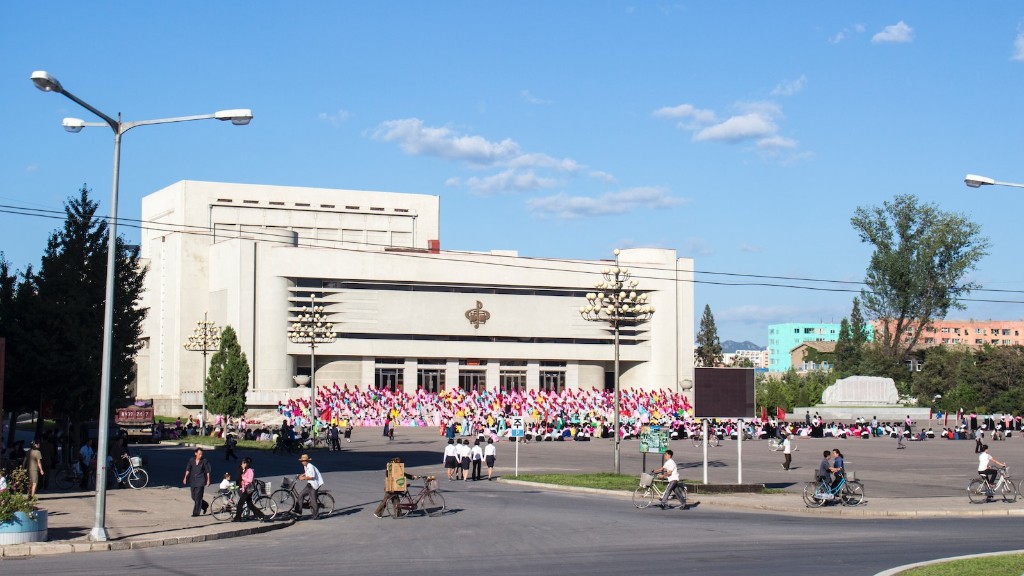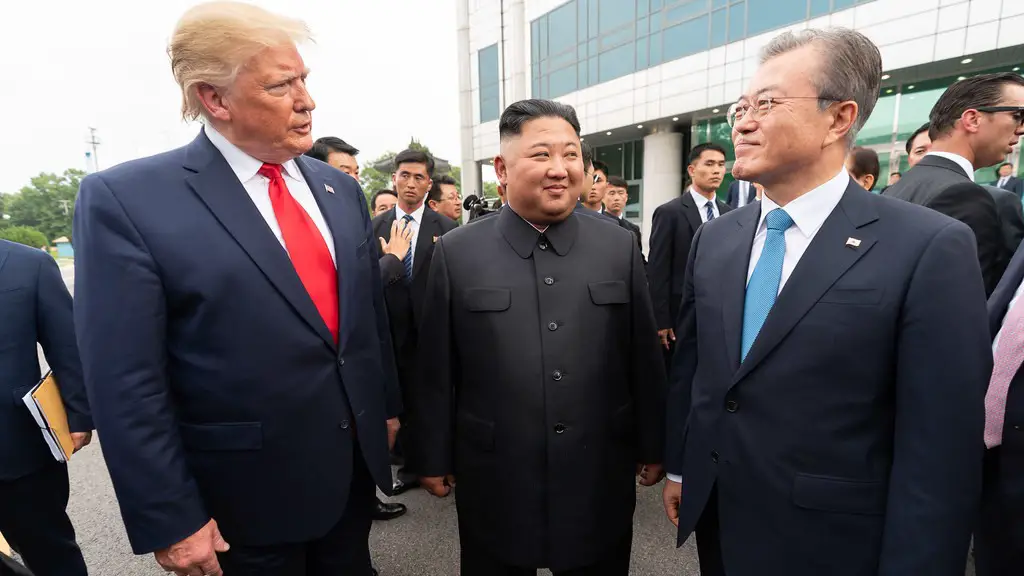Sanctions and Negotiations
North Korea has been a thorn in the world’s side for decades, making erratic and dangerous moves that destabilize the region. In response, governments around the world have applied sanctions both economic and diplomatic, as well as pressuring North Korea to end its nuclear weapons program. According to Dr. Mekahlo Medina, a former China correspondent for NPR, “it is important to remember that North Korea, in its mind, sees itself as a powerful actor on the world’s stage. It has an entrenched culture of autonomy and independence, which means it is resistant to outside pressure or oversight.” So what should the world do about North Korea and its nuclear weapons program?
One of the most popular suggestions is to continue to apply diplomatic and economic pressure through international sanctions. In 2017, the United Nations Security Council unanimously adopted additional sanctions against North Korea in response to the hermit kingdom’s outrageous and dangerous violation of international law. According to Medina, “The current sanctions are concentrated on four areas; diplomatic, financial, military, and economic. With the primary focus being diplomatic and financial sanctions.” So far, North Korea has defied both the United Nations and the United States in its pursuit of a nuclear weapons program.
Another popular suggestion is to focus on the diplomatic approach and to open up a dialogue with North Korea. Re-engaging in the stalled Six-Party Talks has been suggested by many as a way to bring an end to the conflict. According to Dr. Constance A. Furey, a professor of political science at the College of St. Rose, “The Six-Party Talks involve regional stakeholders, including China, Russia, South Korea, Japan, and the United States, who would serve as active interlocutors with North Korea. Such a framework is necessary, as North Korea will not make any concessions in a unilateral agreement with the United States.” The hope is that with all of the regional players at the table, the issue of North Korea’s nuclear weapons program can be resolved through negotiation.
What About Military Action?
In the past, many have suggested that the only way to ensure that North Korea does not become a nuclear power is for military action against the hermit kingdom. The United States has a long history of engaging in military intervention around the world, both overtly and covertly. According to Furey, “the idea of using military force against North Korea is largely considered a non-starter. The hermit kingdom has a well-trained and equipped military, as well as an arsenal of chemical, biological, and nuclear weapons. In addition, North Korea has a large neighbor in China that is strongly opposed to any form of military intervention in the region.”
Military action is seen as a last-ditch option, as it could result in devastating consequences not just for North Korea, but also for regional players such as South Korea and Japan. In addition, the sheer destructive power of a nuclear bomb means that by the time any military action is taken, it may already be too late to stop its spread.
Soft Power
Some have proposed that soft power diplomacy is the best way to handle the issue of North Korea. Soft power diplomacy involves non-military techniques such as exchange programs, economic incentives, cultural exchange initiatives, and the development of shared norms and standards. According to Dr. Nadia Schadlow, a professor at the Fletcher School of Law and Diplomacy, “using soft power to engage North Korea involves focusing on areas such as investment, trade, diplomatic relations, and cultural and scientific exchanges between North Korea and the international community. This type of soft power diplomacy can be used to both ease North Korea’s isolation and, potentially, open up a dialogue between all parties involved in the conflict.”
Soft power is seen as a way to engage North Korea without resorting to dangerous military action, but it is also seen as a long-term solution to the crisis. The challenge with soft power is that it takes a long time to cultivate and establish trust between hostile nations and North Korea has shown itself to be very resistant to outside pressure.
International Pressure and Support
International pressure is seen as an effective way to bring North Korea to the negotiating table. According to Schadlow, “by putting pressure on North Korea from the international community, it will be less able to ignore or refuse to negotiate. International pressure can come in the form of sanctions, sanctions resolutions passed by the United Nations Security Council, or other diplomatic initiatives.” International pressure can be effective, as North Korea is largely dependent on foreign aid and assistance. By putting pressure on North Korea, it may be more willing to negotiate, rather than face the consequences of further sanctions.
In addition, many experts have also suggested that international support and dialogue can be a powerful tool to engage with North Korea. Diplomatic engagement, which would focus on opening up diplomatic channels for communication and negotiation, has been suggested. According to Medina, “by engaging in direct diplomatic dialogue with North Korea, the international community would be able to open up a meaningful conversation, and potentially lead to a path of negotiation and de-escalation.”
What will it take to engage?
North Korea has been a difficult challenge for the international community for decades. The hermit kingdom has made many provocative and dangerous moves, leaving the international community scrambling to find an effective way to deal with it. As was mentioned previously, there are a variety of possible solutions, such as sanctions, negotiation, military action, soft power, and international pressure and support, but the question remains: what will it take to engage North Korea?
In order to engage North Korea, it is necessary to take into account the unique challenges it poses, as well as the complex regional and international dynamics at play. North Korea is a unique situation and it requires a unique set of strategies and tactics in order to engage with it. It may take a combination of economic sanctions and diplomatic negotiations, as well as pressure from the international community and support from regional players, in order to bring an end to the conflict with North Korea.
Humanitarian Aid
Humanitarian aid is another possible solution to the problem of North Korea. Despite the country’s aggressive and erratic behavior, its citizens are still facing a humanitarian crisis and are in need of assistance. According to Schadlow, “by providing humanitarian aid to North Korea, it may be possible to bring the country to the negotiating table, as it would send a signal that the international community is serious about engaging in dialogue.”
Humanitarian aid can provide much needed relief to North Koreans suffering from food shortages and poverty. In addition, it can also be used to build bridges between North Koreans and the international community, leading to increased trust and cooperation. However, humanitarian aid must be handled carefully and with transparency, in order to ensure that it is used for its intended purpose and not diverted for other uses by the North Korean government.
Economic Sanctions
Economic sanctions have been seen as one of the most effective tools to bring North Korea to the negotiating table. Sanctions on the North Korean economy can limit the country’s ability to fund its nuclear weapons program and other military activities. According to Medina, “the current sanctions are broad-based and are intended to limit North Korea’s access to international financial markets and cut the country off from hard currency.” However, these sanctions can also have a devastating effect on the North Korean people, leading to food shortages and other dire consequences.
In addition, the effectiveness of sanctions is dependent on the cooperation of countries such as China, who are key trading partners with North Korea. If these countries are not willing to cooperate, then the sanctions are likely to have little to no impact on the hermit kingdom.
International Cooperation
International cooperation is seen as essential to the long-term success of any plan to engage North Korea. In other words, it is necessary for all stakeholders to work together in order to find a solution to the issue of North Korean aggression. According to Furey, “International cooperation is needed in order to ensure that all parties involved are working towards the same goals and that each has a vested interest in the success of any negotiations.”
By being open to dialogue and working together, it may be possible to find a way to engage North Korea and bring an end to its nuclear weapons program. International cooperation is the key to unlocking the potential of the situation, and by involving all relevant stakeholders, it may be possible to end the conflict with North Korea.


